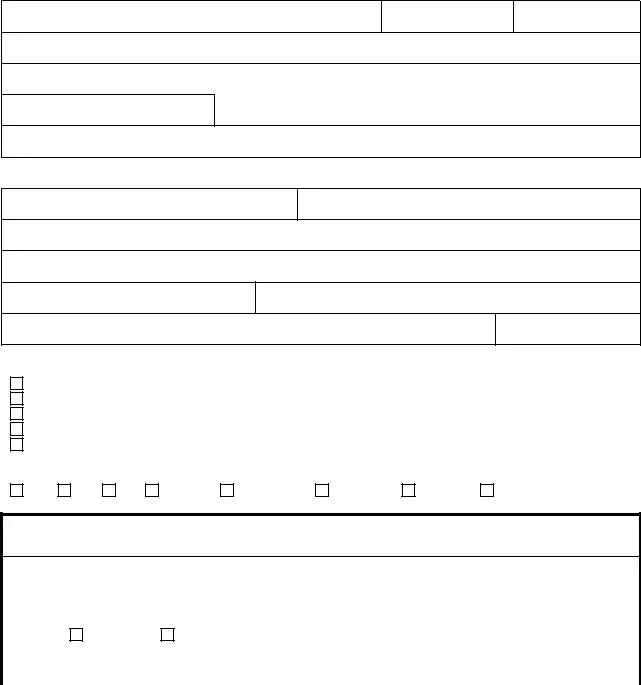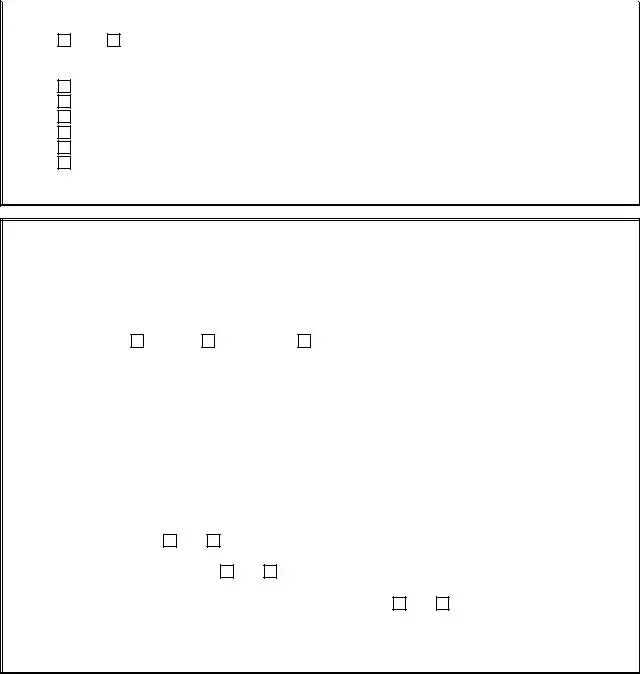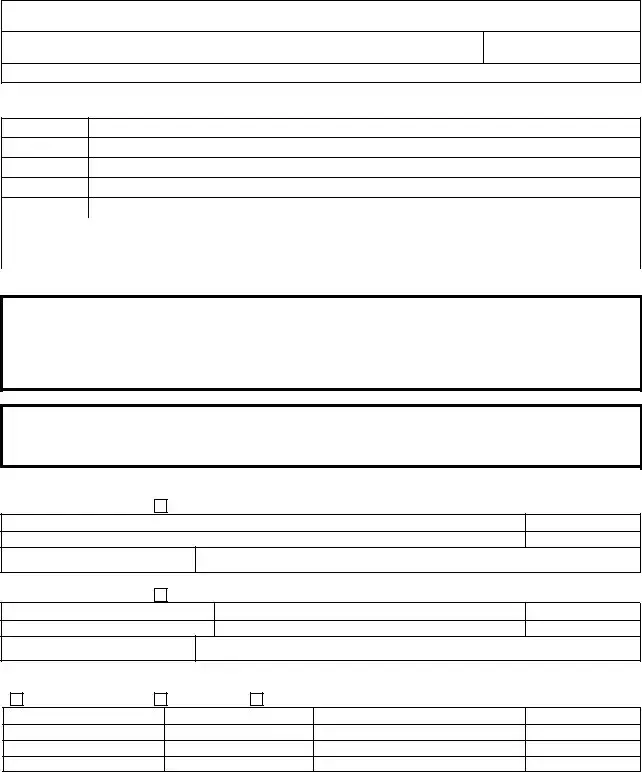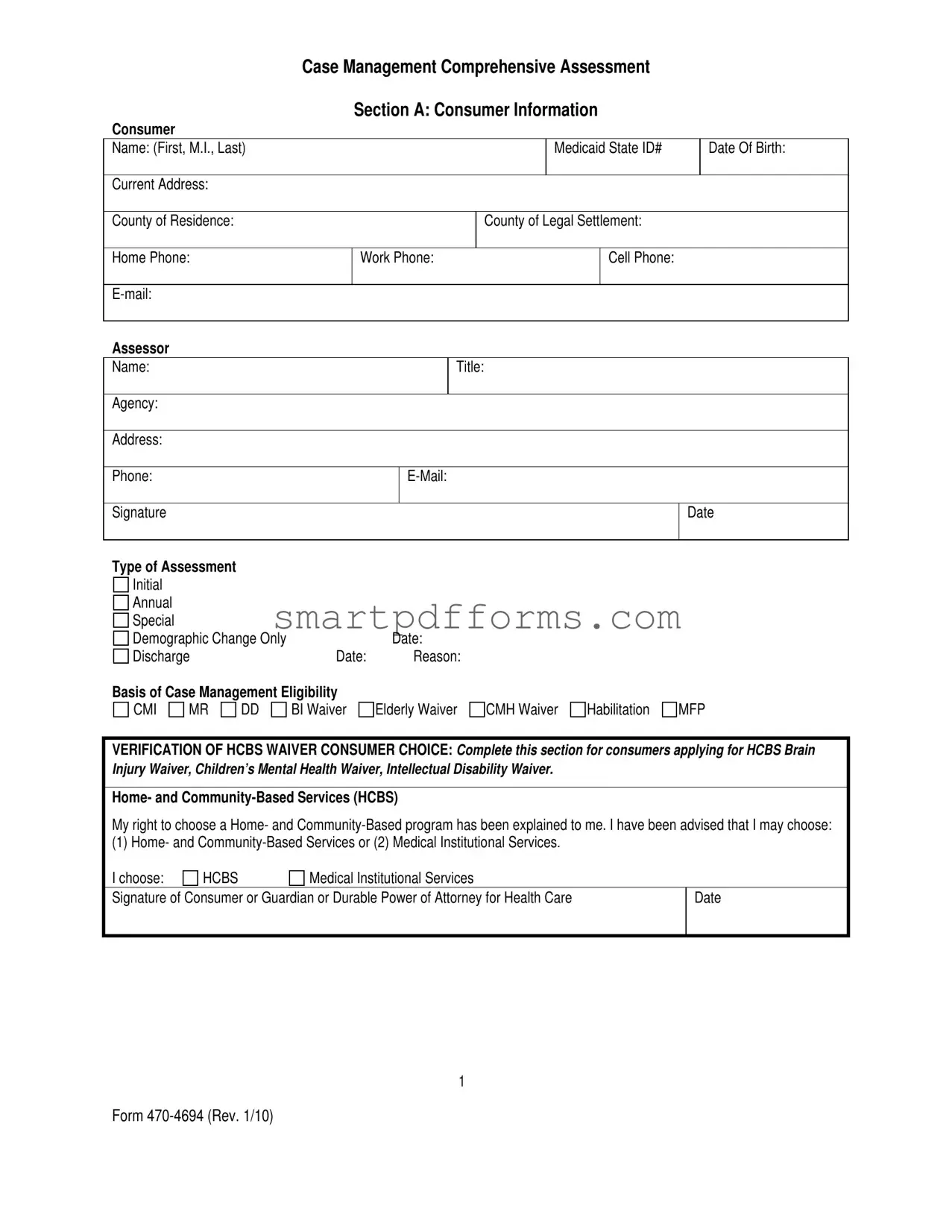Blank Case Management Assessment PDF Template
The Case Management Comprehensive Assessment form is a crucial document designed to ensure that individuals receive tailored health and social services that meet their unique needs. It gathers extensive information about the consumer, starting with basic details such as name, address, Medicaid State ID, and contact information. The form takes a deep dive into various aspects of the consumer's life, including demographic changes, legal status, financial resources, emergency contacts, and detailed medical history. It distinguishes between initial, annual, or special assessments and requires input from interdisciplinary team members, showcasing a holistic approach to case management. Verification of the consumer's choice regarding Home- and Community-Based Services (HCBS) Waiver programs is emphasized, offering options between HCBS and Medical Institutional Services. Details about the consumer's legal decision-makers and financial decision-makers are meticulously collected to ensure comprehensive support and proper handling of their affairs. Moreover, the form addresses specific needs such as language barriers, court involvement, and veteran status, and provides sections dedicated to both adults and children, highlighting the emphasis on personalized care across different age groups. The inclusion of medical and mental health information, including diagnoses and healthcare provider details, underlines the form's role in facilitating coordinated and effective case management designed to support individuals in navigating complex health and social service systems.
Preview - Case Management Assessment Form

Case Management Comprehensive Assessment
Section A: Consumer Information
Consumer
Name: (First, M.I., Last)
Current Address:
Medicaid State ID#
Date Of Birth:
County of Residence:
Home Phone:
|
County of Legal Settlement: |
|
|
|
|
Work Phone: |
|
Cell Phone: |
|
|
|
Assessor
Name:
Agency:
Address:
Phone:
Signature
Title:
Date
Type of Assessment |
|
|
|
|
Initial |
|
|
|
|
Annual |
|
|
|
|
Special |
|
|
|
|
Demographic Change Only |
|
Date: |
||
Discharge |
|
Date: |
Reason: |
|
Basis of Case Management Eligibility |
|
|||
CMI |
MR |
DD |
BI Waiver |
Elderly Waiver |
CMH Waiver
Habilitation
MFP
VERIFICATION OF HCBS WAIVER CONSUMER CHOICE: Complete this section for consumers applying for HCBS Brain Injury Waiver, Children’s Mental Health Waiver, Intellectual Disability Waiver.
Home- and
My right to choose a Home- and
(1) Home- and
|
I choose: |
HCBS |
Medical Institutional Services |
|
|
Signature of Consumer or Guardian or Durable Power of Attorney for Health Care |
Date |
||
|
|
|
|
|
1
Form

Case Management Comprehensive Assessment
Consumer Name:
Interdisciplinary team members consulted (including consumer):
Name
Title (if applicable)
Relationship to Consumer
Additional records reviewed:
Consumer Demographics
Gender: |
Female |
Male |
Language:
Speaks English
Understands English
Needs interpreter services
Comments:
Yes
No
Monthly Income: (Please check all that apply) |
|
Source |
Amount |
SSI |
$ |
SSDI |
$ |
Employment |
$ |
Other (specify): |
$ |
Comments: |
|
Court Involvement: |
|
Involuntary Commitment |
|
Probation or Parole |
|
Child in Need of Assistance (CINA) |
|
Child Protection |
|
Delinquency |
|
Foster Care |
|
Other (Identify) |
|
None |
|
Comments: |
|
2
Form

Case Management Comprehensive Assessment
Consumer Name:
Legal decision maker: (Please check all that apply)

 None
None 
 Guardian
Guardian 

Other (Specify):
Address:
Home Phone:
Work Phone:
Cell Phone:

 Guardian
Guardian 

Other (Specify):
Address:
Home Phone:
Work Phone:
Cell Phone:
Financial Decision Maker: (e.g. Conservator or |
No |
Name: (First, M.I., Last) |
|
Yes
(complete below)
Address: |
|
|
|
|
|
|
|
|
|
Home Phone: |
|
|
Work Phone: |
Cell Phone: |
|
|
|
|
|
|
|
|
|
|
|
|
|
|
|
Payee: |
No |
Yes (complete below) |
|
|
Name: (First, M.I., Last) |
|
|
|
|
|
|
|
|
|
Address: |
|
|
|
|
|
|
|
|
|
Home Phone: |
|
|
Work Phone: |
Cell Phone: |
|
|
|
|
|
|
|
|
|
|
|
|
|
|
|
Emergency Contacts: |
|
|
|
|
Primary Contact |
|
|
|
|
Name: (First, M.I., Last) |
|
|
Relationship: |
|
|
|
|
|
|
Address: |
|
|
|
|
|
|
|
|
|
Home Phone: |
|
|
Work Phone: |
Cell Phone: |
|
|
|
|
|
|
|
|
|
|
|
|
|
|
|
3
Form

Case Management Comprehensive Assessment
Consumer Name:
Secondary Contact (if applicable):
Name: (First, M.I., Last) |
|
Relationship: |
|
|
|
Address: |
|
|
|
|
|
Home Phone: |
Work Phone: |
Cell Phone: |
|
|
|
|
|
|
|
|
|
|
|
|
Complete This Section For Adults (Age 18 and Over)
Veteran:
Yes
No
Marital Status: |
|
Never Married |
|
Married |
Spouse’s Name: |
Divorced |
|
Legally Separated
Widowed
Unknown or Other – Specify
Comments:
Complete This Section For Children (Age 17 and Under)
With whom does the child live?
(If the child currently lives in a institutional setting, please make note in the comments section below.)
What are the child’s parent’s names?
Parents marital status: |
Married |
Divorced |
Never married |
If the parent’s are not living together, what is the
Street:
City, State, Zip:
Parent’s contact information (if different from the child’s):
Home Phone:
Work Phone:
Cell Phone:
Are there siblings in the home? |
Yes |
No |
|
Are any siblings receiving waiver services? |
Yes |
No |
|
Are there any individuals who are not supposed to have contact with the child? If yes, specify:
Other Comments:
Yes
No
4
Form

Case Management Comprehensive Assessment
Consumer Name:
Medical Information
Diagnoses:
Medical:
Diagnosis
Name and credential of professional making diagnosis:
Date of diagnosis:
Comments:
Mental Health
Axis 1:
Axis 2:
Axis 3:
Axis 4:
Axis 5:
Name and credential of professional making diagnosis: |
Date of diagnosis: |
|
|
Comments: |
|
Complete this section for consumers applying for or receiving HCBS Intellectual Disability Waiver.
List the most current IQ score, or if the IQ isn’t listed, give the consumer’s level of functioning within the range of mental retardation (mild, moderate, severe, profound):
IQ: |
Range: |
Date of Evaluation: |
Complete this section for consumers applying for or receiving HCBS Brain Injury Waiver.
Diagnosis: |
Date Injury Occurred: |
Health Care Provider Information:
Who is your regular doctor? |
None |
|
Name |
|
Address |
|
|
|
Phone
Date of last visit (if known):
Reason:
Who is your regular dentist?
Name
None
Address
Phone
Date of last visit (if known):
Reason:
Are you seeing any other doctors, such as a psychiatrist, or specialists of any kind?
Yes (list below) |
No |
Don’t know |
Name
Specialty
Address
Phone
5
Form

Case Management Comprehensive Assessment
Section B: Medical and Physical Health
Health Conditions
B1. Overall, how would you rate your physical health? |
|
|
|
||
Excellent |
Good |
|
Fair |
Poor |
No Response |
Comments: |
|
|
|
|
|
B2. Do you have any health problems that require assistance to manage?
Cardiac
Skin Related
G.I. Disorders
Urinary Tract
Weight problems
Evidence of communicable disease
Other – Specify
None
How do they affect you and how long have you had them?
Comments:
B3. Any respiratory problems that require assistance to manage?
Ventilator
Oxygen
Suctioning
Tracheotomy
Cardiorespiratory monitor
Chest physiotherapy
Nebulizer treatment
Other – Specify
None
How do they affect you and how long have you had them?
Comments:
B4. Do you regularly receive any of the following medical treatments?
Days per week |
Hours per day |
Nursing |
no |
yes |
Physical Therapy |
no |
yes |
Occupational Therapy |
no |
yes |
Speech Therapy |
no |
yes |
Supervision for Safety |
no |
yes |
Diabetes Education |
no |
yes |
Dialysis |
no |
yes |
Respiratory Treatment |
no |
yes |
Catheter Care |
no |
yes |
Colostomy Care |
no |
yes |
Nasogastric Tube Care |
no |
yes |
Other |
no |
yes |
6
Form

Case Management Comprehensive Assessment
Consumer Name:
B5. Hearing
No hearing impairment.
Hearing impairment, but managed through assistive devices
Hearing difficulty at level of conversation.
Hears only very loud sounds.
No useful hearing.
Not determined.
Comments:
B6. Vision
Has no impairment of vision.
Vision impairment, but managed through assistive devices
Has difficulty seeing at level of print
Has difficulty seeing obstacles in environment
Has no useful vision.
Not determined.
Comments:
B7. Speech/Communication
Communicates independently or impairment has been compensated to function independently.
Communicates with difficulty but can be understood.
Communicates with sign language, symbol board, written messages, gestures or an interpreter.
Communicates inappropriate content, makes garbled sounds, or displays echolalia.
Does not communicate.
Comments:
B8. Sensory Perception (e.g. – taste, smell, tactile, spatial)
No impairment
Impaired – Specify
Comments:
B9. Cognitive Status
Alert and fully oriented
Alert and oriented with significant alteration on
Generally oriented through use of assistive techniques
Cognitive deficits (e.g. orientation, attention/concentration, perception, memory, reasoning)
Exhibits mental status changes consistent with psychiatric disorder
Comatose, but responsive
Comatose, but unresponsive
Other – Specify
Comments:
B10. Musculoskelatal/Fine or Gross Motor Skills
No Impairment of Musculoskelatal/Fine or Gross Motor Skills |
|
|||
Impaired muscle tone |
|
|
|
|
Contractures |
|
|
|
|
Scoliosis |
|
|
|
|
Paralysis: |
Hemiplegia |
Paraplegia |
Quadriplegia |
Other (Specify) |
Comments:
7
Form

Case Management Comprehensive Assessment
Consumer Name:
Complete This Section For Adults (Age 18 and Over)
|
B11. Do you have someone who could stay with you for a while if you were sick or needed help? |
|
|
|
|
||
|
|
Yes (Complete below) |
No |
|
|
|
|
|
|
Name: |
Relationship: |
|
|
|
|
|
|
Address: |
|
|
|
|
|
|
|
City, State, Zip code: |
|
|
|
|
|
|
|
Phone: |
|
|
|
|
|
|
B12. Is there anybody you would not want to be involved with your care if you were sick or needed help? |
|
|
|
|
||
|
|
Yes (Complete below) |
No |
|
|
|
|
|
|
Name: |
Relationship: |
|
|
|
|
|
|
|
|
|
|
|
|
|
|
|
|
|
|
|
|
|
|
|
HEALTH CONDITIONS RISK FACTORS |
|
|
YES |
NO |
|
|
|
|
|
|
|
|
|
R1. |
Has the consumer had a seizure in the past year? |
|
|
|
|
|
|
R2. |
Does the consumer have a diagnosis of any other serious medical conditions or other serious health |
|
|
|
|
|
|
|
concerns (i.e., diabetes, cerebral palsy, heart condition, etc.)? |
|
|
|
|
|
|
|
If yes, list all conditions/concerns: |
|
|
|
|
|
|
R3. |
Does the consumer have any life threatening allergies (such as peanuts, bee stings, or shellfish)? |
|
|
|
|
|
|
R4. Is the consumer in need of a primary health care provider (or the provider’s contact information is |
|
|
|
|
||
|
|
|
|
|
|||
|
|
unknown)? |
|
|
|
|
|
|
|
|
|
|
|
|
|
|
R5. |
Is the consumer in need of a dentist (or dentist’s contact information is unknown)? |
|
|
|
|
|
|
R6. Is the consumer in need of a specialist (or the specialist’s contact information is unknown)? |
|
|
|
|
||
|
R7. |
Has the consumer had difficulty making, keeping, or following through with appointments in the last year? |
|
|
|
|
|
|
|
|
|
|
|
|
|
|
R8. |
In the past year, has the consumer gone to a hospital emergency room? |
|
|
|
|
|
|
|
|
|
|
|||
|
|
If yes, how many times? |
Why? |
|
|
|
|
|
|
|
|
|
|
||
|
|
|
|
|
|
|
|
|
R9. |
In the past year, has the consumer stayed overnight or longer in a hospital? |
|
|
|
|
|
|
|
If yes, how many times? |
Why? |
|
|
|
|
|
R10. Is the consumer in need of someone to help if he or she was sick or injured? |
|
|
|
|
||
Comment on any risk factors marked as “Yes” and address the issue in the Crisis Intervention Plan. |
|
|
No. of risks: |
||||
Comments: |
|
|
|
|
|
||
8
Form

Case Management Comprehensive Assessment
Consumer Name: |
|
|
|
|
|
Medication Use |
|
|
|
|
|
B13. Are you currently taking any prescription medication? |
Yes (complete below) |
No |
|||
Medication Name |
Dosage |
|
Frequency |
|
Purpose |
|
|
|
|
|
|
|
|
|
|
|
|
|
|
|
|
|
|
|
|
|
|
|
|
|
|
|
|
|
|
|
|
|
|
|
|
|
|
|
|
|
|
|
|
|
|
|
|
|
|
|
|
|
|
|
|
|
|
|
|
|
|
|
|
|
|
|
|
|
|
|
|
|
|
|
|
|
|
|
|
|
|
|
|
|
|
|
|
|
|
|
|
|
|
|
|
Comments:
B14. Are you currently taking any
Yes (complete below) 
 No
No
Medication Name
Dosage
Frequency
Purpose
Comments:
9
Form

Case Management Comprehensive Assessment
Consumer Name:
Complete this section only if the consumer is taking medications.
B15. Are any of your medications kept in a special place, like a locked container or the refrigerator?

 Yes
Yes 
 No Comments:
No Comments:
B16. |
What pharmacy do you use? |
|
|
B17. |
How do you remember to take your medications? (Check all that apply.) |
|
|
|
By following directions |
Calendar |
|
|
Caregiver gives them |
Bubble wrap/Blister Pack |
|
|
Medpass Machine |
Egg Carton, envelopes |
Other: |
Comments:
B18. How well do you
With no help or supervision
With some help or occasional supervision
With a lot of help or constant supervision
Unable to administer own medications/caregiver gives them
Comments:

 RN
RN
|
|
MEDICATION ERROR RISK FACTORS |
|
|
|
YES |
|
NO |
|
||||
|
|
|
|
|
|
|
|||||||
|
3 = Frequently 2 = Sometimes 1 = Rarely 0 = Never |
|
|
3 |
|
|
2 |
1 |
|
|
0 |
|
|
|
|
|
|
|
|
|
|
|
|
|
|
||
|
R11. |
Has the consumer had problems with not taking or not receiving medications on time? |
|
|
|
|
|
|
|
|
|
|
|
|
|
|
|
|
|
|
|
|
|
|
|
|
|
|
R12. |
Has the consumer had problems with taking or being given the incorrect number of |
|
|
|
|
|
|
|
|
|
|
|
|
|
|
|
|
|
|
|
|
|
|
|
||
|
|
medications? |
|
|
|
|
|
|
|
|
|
|
|
|
|
|
|
|
|
|
|
|
|
|
|
|
|
|
|
|
|
|
|
|
|
|
|
|
|
|
|
|
|
|
|
|
|
|
|
|
|
|
|
|
|
|
R13. Has the consumer had problems with medications not being refilled on time? |
|
|
|
|
|
|
|
|
|
|
|
|
|
|
|
|
|
|
|
|
|
|
|
|
|
|
|
R14. Have there been issues with medications not being |
|
|
|
|
|
|
|
|
|
|
|
|
|
|
|
|
|
|
|
|
|
|
|
|
|
|
|
R15. |
Has the consumer had significant side effects from medications? |
|
|
|
|
|
|
|
|
|
|
|
|
|
|
|
|
|
|
|
|
|
|
|
|
|
|
R16. |
Has the consumer had significant medication changes in the past year? |
|
|
|
|
|
|
|
|
|
|
|
|
|
|
|
|
|
|
|
|
|
|
|
|
|
|
R17. |
Has the consumer refused or spit out medications? |
|
|
|
|
|
|
|
|
|
|
|
|
|
|
|
|
|
|
|
|
|
|
|
|
|
|
R18. |
Have there been problems with drug interactions? |
|
|
|
|
|
|
|
|
|
|
|
|
|
|
|
|
|
|
|
|
|
|
|
||
|
|
|
|
|
|
|
|
|
|
|
|
|
|
|
R19. Has the consumer experienced health problems because of missing/refusing |
|
|
|
|
|
|
|
|
|
|
|
|
|
|
medications? |
|
|
|
|
|
|
|
|
|
|
|
|
|
|
|
|
|
|
|
|
|
|
|
|
|
|
R20. |
Has the consumer misused prescription or |
|
|
|
|
|
|
|
|
|
|
|
|
|
|
|
|
|
|
|
|
|
|
|
||
|
|
many at once)? |
|
|
|
|
|
|
|
|
|
|
|
|
|
|
|
|
|
|
|
|
|
|
|
|
|
|
|
|
|
|
|
|
|
|
|
|
|
|
|
|
|
|
|
|
|
|
|
|
|
|
|
|
|
|
R21. |
Has the consumer taken another person’s prescription medications? |
|
|
|
|
|
|
|
|
|
|
|
|
|
|
|
|
|
|
|
|
|
|
|
|
|
|
R22. |
Has the consumer used |
|
|
|
|
|
|
|
|
|
|
|
|
R23. Has the consumer used multiple pharmacies or multiple physicians in the past year? |
|
|
|
|
|
|
|
|
|
|
|
|
|
|
|
|
|
|
|
|
|
|
||||
|
Comment on any risk factors marked as “Yes” and address the issue in the Crisis |
|
|
No. of risks: |
|
|
|
|
|
||||
|
Intervention Plan. |
|
|
|
|
|
|
|
|
|
|
|
|
|
Comments: |
|
|
|
|
|
|
|
|
|
|
|
|
10
Form
Form Data
| Fact | Description |
|---|---|
| Form Purpose | The Case Management Comprehensive Assessment form is designed to gather thorough information for consumer case management, focusing on their eligibility and needs for Home- and Community-Based Services (HCBS) or medical institutional services. |
| Sections Covered | It includes sections on consumer information, demographics, legal decision makers, emergency contacts, marital and veteran status, children-specific information, and medical information including mental health assessments and diagnoses. |
| Waivers and Eligibility | Highlights eligibility for different waivers such as Brain Injury Waiver, Intellectual Disability Waiver, and others, emphasizing verification of HCBS waiver consumer choice between HCBS and medical institutional services. |
| Consumer Rights | Emphasizes the consumer's right to choose between Home- and Community-Based Services (HCBS) and Medical Institutional Services, ensuring the consumer or their guardian makes an informed decision. |
| Legal Framework | Governing laws vary by state; however, this form typically falls under state-specific regulations concerning case management and HCBS program eligibility and implementation. |
| Assessment Types | Identifies the type of assessment being conducted—Initial, Annual, Special, or Demographic Change Only—to adapt the form's application to the consumer's current needs and situation. |
| Professional Input | Includes sections for input from interdisciplinary team members and a comprehensive review of additional records, ensuring a holistic approach to the consumer's case management planning. |
Instructions on Utilizing Case Management Assessment
Once you've received the Case Management Assessment form, the task ahead involves carefully inputting relevant details about the consumer, ensuring all required sections are completed accurately. It's vital to approach this process systematically, capturing thorough information for a holistic assessment. After the form is filled out, it will be reviewed and then processed, which will involve verification of the details provided and possibly a few follow-ups to clarify or acquire additional data.
- Start with Section A: Consumer Information. Enter the consumer's name, including first name, middle initial, and last name.
- Fill in the consumer's current address, Medicaid State ID#, date of birth, county of residence, home phone, county of legal settlement, work phone, cell phone, and email address.
- Under "Assessor Name," input your name, title, agency, address, phone number, and email. Sign and date in the provided spaces.
- Select the type of assessment being conducted (Initial, Annual, Special, Demographic Change Only) and fill in the applicable dates and reason.
- Check the relevant box under Basis of Case Management Eligibility that applies to the consumer.
- Complete the VERIFICATION OF HCBS WAIVER CONSUMER CHOICE section by marking the consumer's choice between Home- and Community-Based Services and Medical Institutional Services. Have the consumer or their guardian sign and date.
- Proceed to list interdisciplinary team members consulted, including their names, titles, relationships to the consumer, and any additional records reviewed.
- In the Consumer Demographics section, check the applicable boxes regarding the consumer's gender, language competencies, monthly income sources and amounts, and court involvement. Fill out any relevant comments.
- Identify and fill out the details for any legal decision maker, co-decision maker, financial decision maker, and payee, including their names, addresses, and contact information.
- Document emergency contact information for both primary and secondary contacts.
- For adults (age 18 and over), indicate veteran status, marital status, and add comments as necessary. For children (age 17 and under), provide living arrangements, parental information, sibling information, and other pertinent comments.
- Detail the consumer's medical information across all required fields for medical, mental health, intellectual disability, or brain injury waivers, including diagnoses, dates, health care provider information, and any relevant evaluations.
It's crucial to be diligent and precise when filling out the form to ensure all information reflects the consumer's current and accurate situation. After completion, review the form for any errors or omissions, then proceed to submit it according to the specified instructions for assessment and further processing.
Obtain Answers on Case Management Assessment
Here is a list of frequently asked questions (FAQs) about the Case Management Assessment form:
-
What is the purpose of the Case Management Comprehensive Assessment form?
This form serves as a detailed tool to gather comprehensive information about an individual (consumer) requiring case management services. It includes sections on personal data, medical and mental health diagnoses, legal and emergency contacts, financial information, and eligibility for certain waivers. The assessment's goal is to ensure that the case manager has a complete understanding of the individual's needs to adequately plan, facilitate, and coordinate care.
-
Who fills out this form?
The form is completed by the assessor, who can be a case manager or another professional conducting the assessment. It may involve input from the consumer (the person receiving services), as well as consultation with interdisciplinary team members, review of additional records, and information from legal and financial decision-makers associated with the consumer.
-
What are the different types of assessments indicated on the form?
There are four types of assessments:
- Initial: The first comprehensive evaluation when services begin.
- Annual: A yearly follow-up to review and update the consumer's needs and services.
- Special: Conducted if there is a significant change in the consumer's condition or circumstances that could alter service needs.
- Demographic Change Only: Used to document changes in personal information that do not affect service needs, such as a new address.
-
What is HCBS Waiver, and why is consumer choice verification important?
Home- and Community-Based Services (HCBS) Waivers allow individuals with disabilities and seniors to receive services in their homes or communities rather than in long-term care facilities or institutions. Verifying the consumer's choice ensures that they are informed and consent to the type of services they receive, respecting their preference for either HCBS or medical institutional services.
-
How is legal decision-making status addressed in the form?
The form identifies any legal decision-makers, such as a guardian or attorney-in-fact, involved in the consumer's care. It also details if the consumer has any financial decision-makers or payees, emphasizing the importance of understanding who has the legal authority to make decisions on behalf of the consumer.
-
Can the form be used for both adults and children?
Yes, the Case Management Comprehensive Assessment form accommodates both adult and child consumers. For children, it includes sections to detail living arrangements, parental information, and whether any siblings are receiving waiver services. This ensures that the case management plan addresses the specific needs of children and their family context.
-
What information is captured under the Consumer Demographics section?
This section collects basic demographic information such as gender, language preferences, monthly income sources, and court involvement. It helps in understanding the consumer’s background and potential areas where language or other support services may be needed.
-
How are medical and mental health diagnoses documented?
The Medical Information section records both medical and mental health diagnoses using the DSM-IV-TR classification for mental health. It includes the name and credentials of the professional making the diagnosis, date of diagnosis, and comments for additional context. For consumers applying for or receiving HCBS Intellectual Disability or Brain Injury Waiver, there are specific instructions to document IQ scores or injury details, respectively.
Common mistakes
Filling out the Case Management Assessment form accurately is crucial for ensuring that individuals receive the appropriate level of care and support. However, several common mistakes can lead to delays or inaccuracies in service. Here is a list of eight common mistakes made during the completion of this form:
- Not verifying consumer information: Failing to double-check details like the consumer's name, Medicaid State ID#, or contact information can lead to significant issues in record-keeping and communication.
- Incomplete demographic data: Skipping sections such as "Marital Status" for adults or not specifying living arrangements for children can impact the assessment of needs and services provided.
- Unclear legal decision-making status: Not clearly indicating whether there is a guardian, attorney-in-fact, or other legal decision-maker can complicate case management processes.
- Overlooking financial details: Neglecting to accurately record monthly income sources or not specifying a financial decision maker/payee may affect the determination of eligibility for certain services.
- Misunderstanding the basis of case management eligibility: Misidentifying the eligibility category (e.g., CMI, MR, DD, BI) can direct the assessment towards an inappropriate service pathway.
- Ignoring medical and mental health diagnosis sections: Failing to complete these sections thoroughly with the correct diagnosis date and professional details can result in an incomplete understanding of the consumer's needs.
- Omitting choice in HCBS waiver consumer choice verification: Not documenting whether the consumer chooses Home- and Community-Based Services or Medical Institutional Services can lead to incorrect service allocation.
- Forgetting to update or provide emergency contact information: Incomplete emergency contacts can hamper communication in crucial situations.
Correctly filling out the Case Management Assessment form is a step towards ensuring that consumers receive the right support tailored to their needs. Avoiding these mistakes requires attention to detail and an understanding of the form's requirements.
Documents used along the form
When working with the Case Management Comprehensive Assessment form, a variety of other documents and forms are commonly utilized to ensure comprehensive case management and care coordination. These documents help in gathering a full picture of the individual's needs and circumstances, thereby facilitating better planning and support.
- Service Plan: Outlines the services and supports the individual requires, as identified during the assessment process. It includes specific goals and the strategies to achieve them.
- Health Information Release Form: Authorizes the sharing of the individual's health and medical information among care providers and relevant parties for better coordination of care.
- Medication List: Provides a detailed account of all medications the individual is taking, including dosages and prescribing doctors, to prevent interactions and duplication.
- Emergency Contact Form: Lists contact information for individuals to be notified in case of an emergency, including their relationship to the consumer.
- Risk Assessment: Evaluates the individual’s living situation, health conditions, and other factors to identify potential risks and develop strategies to mitigate them.
- Financial Assessment: Details the individual's income sources, financial resources, and expenses to assist in planning for service payments and identifying potential assistance programs.
- Guardianship or Power of Attorney Documents: Legal documents that specify the appointed guardian or attorney-in-fact, providing them the authority to make decisions on behalf of the individual.
- Consent Forms for Services: Signed documents indicating the individual's agreement to receive specific services or participate in certain programs.
- Behavioral Support Plan: For individuals exhibiting challenging behaviors, this plan outlines strategies and interventions designed to address and modify such behaviors.
- Caregiver Information Form: Collects details about primary caregivers, including their role, availability, and any support they may require to care for the individual effectively.
Together, these documents complement the Case Management Assessment by providing a multi-dimensional view of the individual's needs, which is essential for delivering effective and coordinated care. They facilitate communication among all parties involved and ensure that care decisions are informed, person-centered, and holistic.
Similar forms
Intake Forms for Social Services: Similar to the Case Management Assessment form, social services intake forms collect comprehensive personal and demographic information. They both aim to understand the client's background, needs, and eligibility for specific services or programs.
Medical History Questionnaires: These documents and the Case Management Assessment form share a focus on gathering detailed health information. Both require medical diagnoses, healthcare provider details, and may document mental and physical health status to tailor healthcare or support services.
Legal Representation Forms: Similarities exist here in terms of identifying legal decision-makers and guardians. Both forms collect information on individuals authorized to make decisions on behalf of the client, including attorneys or legal guardians.
Emergency Contact Forms: These forms and the Case Management Assessment form include sections to record emergency contact information. The purpose is to have readily available contact details for primary and secondary contacts in case of an emergency.
Financial Assessment Forms: Similar to the Case Management Assessment, financial assessment forms collect information on an individual's income sources and levels, as well as details on financial decision-makers. This information is crucial for determining eligibility for income-sensitive services or support.
Education Records Request Forms: Although primarily focused on educational history, these forms share the similarity of collecting comprehensive information on an individual for the purpose of assessing needs and providing appropriate services, much like the Case Management Assessment does in a broader context.
Disability Status Verification Forms: Both the Case Management Assessment form and disability status verification forms gather detailed information to determine eligibility for services based on disability status. This may include diagnoses, level of functioning, and the impact of the disability on daily life.
Dos and Don'ts
Filling out the Case Management Assessment form requires careful attention to detail and accuracy. Here are a few guidelines to help ensure the form is completed correctly and effectively.
Things You Should Do
- Double-check the consumer's information, such as the name, current address, Medicaid State ID#, and date of birth, to ensure it matches their official documents.
- Clearly specify the reason and basis for case management eligibility under Basis of Case Management Eligibility, making sure it aligns with the consumer's current needs and conditions.
- For the section on verification of HCBS Waiver Consumer Choice, accurately record the consumer's choice between Home and Community-Based Services and Medical Institutional Services, ensuring their signature or that of their guardian or durable power of attorney for health care is obtained on the correct date.
- Review the interdisciplinary team member consultation section to confirm that all consulted members, including the consumer, are listed with their titles and relationship to the consumer accurately spelled out.
- Ensure that all financial sources, court involvements, and legal decision-maker information are up to date and accurately reflect the consumer's current situation.
Things You Shouldn't Do
- Do not leave blanks in critical fields such as consumer demographics, medical information, and emergency contacts. If a section does not apply, clearly mark it as N/A (Not Applicable).
- Avoid using ambiguous language or abbreviations that might not be universally understood when detailing the diagnoses and medical information.
- Don’t forget to thoroughly review the form for any errors or omissions before considering it complete, especially the consumer or guardian signature sections.
- Resist the urge to rush through filling out the form; taking your time can prevent mistakes that could affect the consumer's access to necessary services.
- Never assume information; always verify details directly with the consumer, their guardian, or through official documents to ensure the accuracy of the information provided.
Misconceptions
Understanding the Case Management Assessment form can often be challenging. There are several misconceptions about the form and its elements. Here, we aim to clarify some of these misunderstandings.
- Misconception 1: The Case Management Assessment form is only for adults.
This is not the case. The form includes sections relevant to both adults and children. While certain sections explicitly ask for information applicable to individuals over or under a certain age, the form's comprehensive nature ensures it caters to a wide demographic, emphasizing the inclusiveness of case management services.
- Misconception 2: Legal decision-making status is irrelevant to case management.
Contrary to this belief, legal decision-making status is crucial for a thorough assessment. Knowing whether a consumer has a legal guardian, conservator, or another form of a legal decision-maker informs case managers about who is authorized to make decisions on the consumer's behalf, thus directly impacting care and service provisions.
- Misconception 3: The form does not accommodate consumers with diverse language needs.
In reality, the form explicitly inquires about the consumer's ability to speak and understand English and whether they require interpreter services. This ensures that language barriers are identified early in the case management process, allowing for appropriate accommodations.
- Misconception 4: All sections of the form must be completed for every assessment.
This is not accurate. The form is designed to be versatile, with certain sections only relevant under specific circumstances. For instance, the HCBS Waiver Consumer Choice section is only filled out when applying for HCBS waivers, tailoring the form to meet varying needs and situations.
- Misconception 5: Income and financial details are not a primary concern of the assessment.
On the contrary, understanding a consumer's financial situation is fundamental. The form dedicates a section to capture information on income sources and amounts, acknowledging the significant impact of economic factors on case management decision-making and service planning.
It is vital to approach the Case Management Assessment form with clarity and understanding. By dispelling these misconceptions, we can better appreciate the form's role in facilitating comprehensive and effective case management services that cater to the unique needs of each consumer.
Key takeaways
Completing the Case Management Comprehensive Assessment form requires meticulous attention to detail. Here are some key takeaways to ensure that the process is both thorough and effective:
- Gather comprehensive consumer information, including personal identifiers, contact information, and Medicaid State ID#, to ensure the form is accurately associated with the correct individual.
- Determine the type of assessment needed (Initial, Annual, Special, or for Demographic Change Only) as this will guide the depth and focus of the completed assessment.
- For consumers applying for HCBS Waivers, such as the Brain Injury Waiver or Intellectual Disability Waiver, ensure that their right to choose between Home- and Community-Based Services and Medical Institutional Services is clearly explained and documented.
- Detailed documentation of the consumer's demographics, such as gender, language proficiency, and monthly income sources, is crucial for tailoring case management services to their specific needs.
- Identifying any legal decision-makers, including guardians or attorneys-in-fact, is essential for making informed decisions about the consumer's care and financial management.
- Recording emergency contact information guarantees that there are points of contact available in situations requiring immediate attention.
- The form distinguishes between assessments for adults and children, indicating the importance of age-appropriate considerations in case management.
- For children under 18, details about living arrangements, parental status, and sibling information help provide a comprehensive view of the child’s home and social environment.
- Documenting medical information, including diagnoses, the professionals making these diagnoses, and any recent health care provider visits, ensures that the case management plan addresses all aspects of the consumer's health.
- Specific sections dedicated to HCBS Waivers require detailed information about the consumer's IQ or level of functioning and the nature of any brain injuries, highlighting the need for tailored services based on individual assessments.
Approaching the Case Management Comprehensive Assessment with these key points in mind will facilitate a thorough, accurate, and person-centered assessment process, laying a strong foundation for effective case management services.
Popular PDF Forms
Ca Jury Duty - Special circumstances not explicitly covered by the form's guidelines may still qualify for excusal with appropriate evidence.
Miss Punch Application - A tool for documenting and correcting any instances where employees fail to properly use the time clock, promoting fair and accurate pay practices.
Check Food Stamp Status Phone Number Alabama - Completion of this form is a critical step for anyone seeking to work in environments requiring unsupervised access to children.
